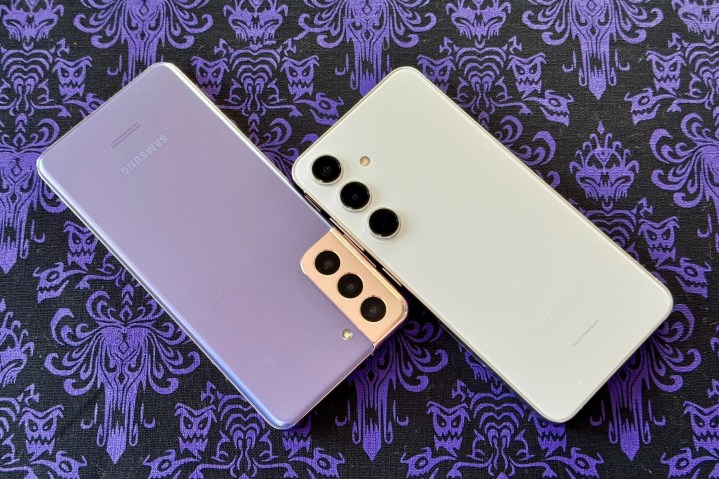
Your Samsung Galaxy S21 has recently turned three years old. To celebrate its milestone, you may want to consider upgrading to a newer model, such as the newly released Samsung Galaxy S24. With a newer processor, improved display, longer battery life, and other upgrades, it can look like a really tempting offer.
But is the Galaxy S24 really worth the $800 asking price if you still have a Galaxy S21? Here’s everything you need to know before deciding.
Samsung Galaxy S24 vs. Samsung Galaxy S21: specs
| Galaxy S24 | Galaxy S21 | |
|---|---|---|
| Weight | 5.93 oz (168.0 g) | 6.03 oz (171.0 g) |
| Dimensions | 5.79 x 2.78 x 0.30 inches (147 x 70.6 x 7.6mm) | 5.97 x 2.80 x 0.31 inches (151.7 x 71.2 x 7.9 mm) |
| Screen size, specs | 6.2-inch Dynamic AMOLED 2X
Scratch-resistant glass (Corning Gorilla Glass Victus 2) |
6.2-inch Dynamic AMOLED 2X Infinity Flex Display
Scratch-resistant glass (Corning Gorilla Glass Victus) |
| Screen resolution | 2340 x 1080 pixels, 19.5:9 ratio, 416 ppi
120Hz refresh rate 2600 nits peak brightness |
2400 x 1080 pixels, 20:9 ratio, 424 ppi
120Hz refresh rate 1300 nits peak brightness |
| Operating system | Android 14 | Shipped with Android 11, upgradeable to Android 14 |
| Storage | 128GB or 256GB | 128GB or 256GB |
| Processor | Qualcomm Snapdragon 8 Gen 3 (4 nm) | Qualcomm Snapdragon 888 (5 nm) |
| RAM | 8GB | 8GB |
| Camera | 50MP main,ƒ/1.8 aperture, OIS 12MP ultrawide, ƒ/2.2 aperture 10MP telephoto, ƒ/2.4 aperture, 3x optical zoom 12MP front ƒ/2.2 aperture |
12MP main, ƒ/1.8 aperture, OIS |
| Video | Up to 8K at 30 frames per second (fps)
4K at 60 fps FHD at 120 fps 960 fps for slow motion |
Up to 8K at 24 fps
4K at 30 fps or 60 fps 1080p at 30 fps, 60 fps, or 240 fps |
| Galaxy AI | Yes | No |
| Authentication | Ultrasonic in-screen fingerprint | Ultrasonic in-screen fingerprint |
| Resistance | Water, Dust; IP68 | Water, Dust; IP68 |
| Battery |
4,000 mAh 25W wired charging 15W wireless charging 4.5W reverse wireless charging |
25W wired charging 15W wireless charging 4.5W reverse wireless charging |
| SIM ports | 1 | 2 |
| Network support | 5G (sub-6, mmWave) | 5G (sub-6) |
| Colors | Onyx Black, Marble Grey, Cobalt Violet, Amber Yellow, Jade Green, Sandstone Orange, Sapphire Blue | Phantom Pink, Violet, Gray, White |
| Price | From $800 | From $800 (original) |
Galaxy S24 vs. S21: design and display
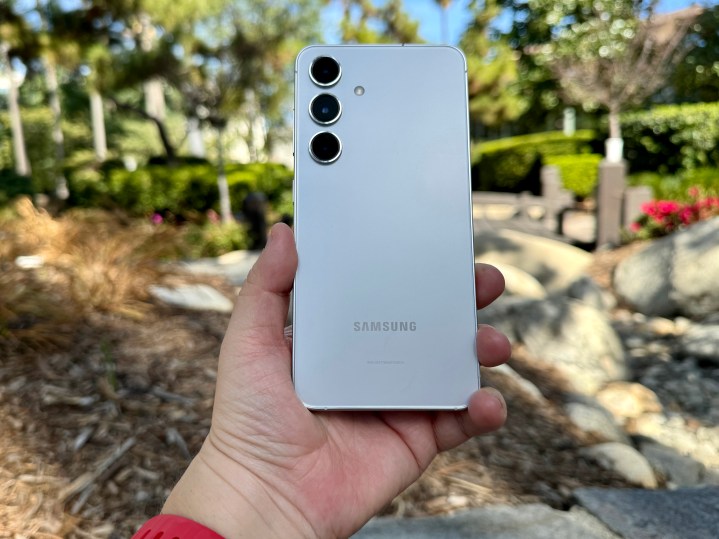
When you compare the Galaxy S21 to the Galaxy S24 from a design perspective, you can notice a few differences. Firstly, the S24 model doesn’t have as defined a camera bump as the S21 does. The S24’s camera sensors are placed individually on the back of the phone, and while they don’t sit completely flush, it’s a much simpler look. Additionally, it’s worth mentioning that the S21 has a plastic back and aluminum frame, while the S24 has a glass back, which gives it a more premium feel and a better grip.
Both phones have a 6.2-inch Dynamic AMOLED display that Corning Gorilla Glass protects. However, the older Galaxy S21 uses Gorilla Glass Victus, while the newer Galaxy S24 has Corning Gorilla Glass Victus 2. The main difference between the two Victus versions is that the newer one has improved drop performance. Corning claims that the Victus 2 glass can survive drops of up to two meters, which is a significant improvement over the first Victus version. This means that the S24 is less likely to suffer from cracks or scratches in case of accidental drops or impacts.
Finally, while both the S24 and S21 have refresh rates that go up to 120Hz for smooth scrolling, only the S24 can go down to 1Hz. By comparison, the S21’s refresh rate only hits a minimum of 48Hz. You may not notice this in day-to-day use, but it means the S24’s screen is much more efficient and translates to better battery life (more on that below).
Galaxy S24 vs. S21: performance and battery
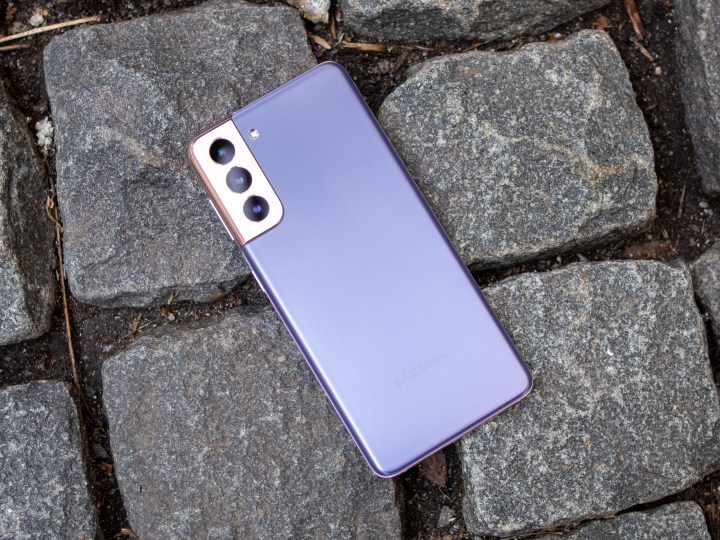
The Galaxy S21 was released with two different processor variants depending on the region. If purchased in North America, Europe, or China, it includes a Qualcomm Snapdragon 888 5G processor. The processor has an octa-core with a 2.84 GHz Kryo 680 Prime core, three 2.42 GHz Kryo 680 cores, and four 1.80 GHz Kryo 680 cores. It is paired with the Adreno GPU, and the exact model number is not specified in the text.
However, in other regions, the S21 shipped with Samsung’s Exynos 2100 processor, which is also an octa-core processor. It has a 2.9 GHz Cortex-X1 core, three 2.80 GHz Cortex-A78 cores, and four 2.2 GHz Cortex-A55 cores. It is paired with the Mali-G78 MP14 GPU.
The newer Galaxy S24 smartphone also has different processors, depending on the location. If you live in North America, it has a Qualcomm Snapdragon 8 Gen 3 for Galaxy chip — a modified version of the standard Snapdragon 8 Gen 3. The processor includes either an octa-core or deca-core, depending on the region, with core speeds ranging from 1.95GHz to 3.39GHz, and it is paired with the Adreno GPU. In other areas, the S24 ships with an in-house Exynos 2400 processor.
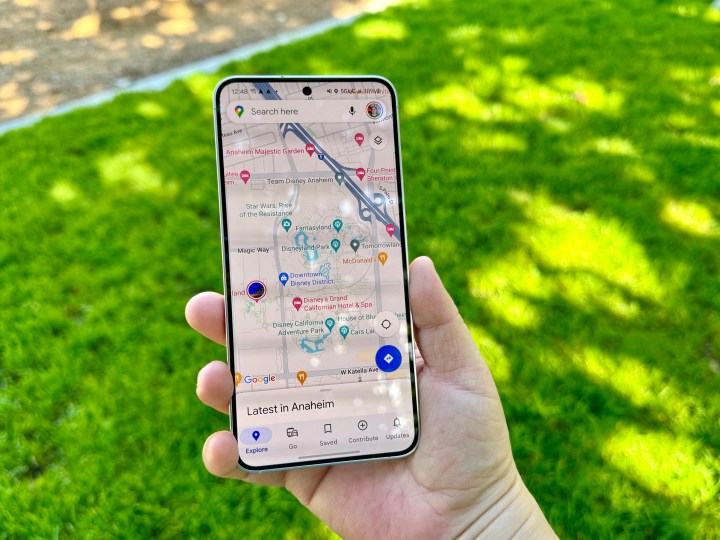
When upgrading from the S21 to the S24, you’ll almost certainly experience a smoother and faster performance, depending on your usage. The Galaxy S24 is a performance beast, handling apps and games without any problem. The S21 is still a capable phone in 2024, but you’re bound to notice a speed improvement if you upgrade.
It’s worth noting that Samsung has made no alterations to the battery between the S21 and S24 models; both feature a 4,000 mAh battery. Our review of the S21 found that its battery life was “just average,” but it should be enough to get you through an entire day. However, it’s essential to remember that with time, the battery deteriorates, resulting in shorter battery life.
Meanwhile, the Galaxy S24 has proven to have excellent battery life, easily getting through more than a full day per charge. Although the battery capacities are the same, the newer and more efficient chipset allows it to keep running for longer in between charges.
Galaxy S24 vs. S21: cameras
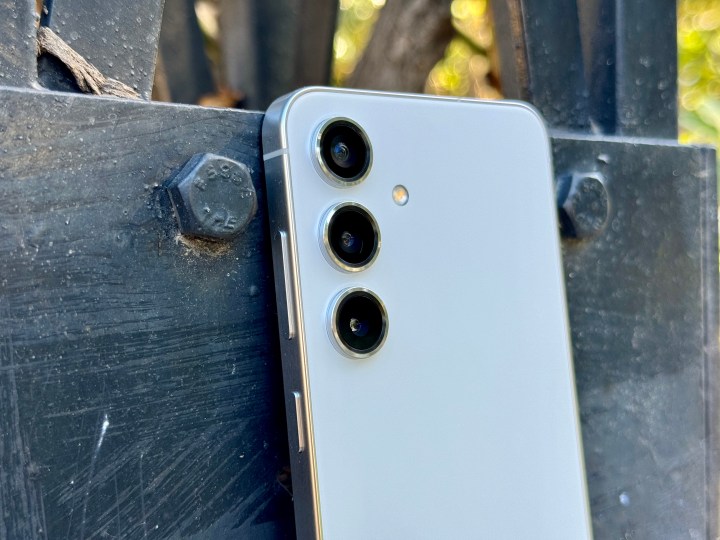
Regarding smartphone technology, camera systems are one of the areas manufacturers usually make steady improvements on. It is, therefore, not surprising that you will find some nice upgrades between the Samsung Galaxy S21 and S24 models.
The Galaxy S24 boasts a 50-megapixel main camera, a 12MP ultrawide camera, and a 10MP telephoto camera with 3x optical zoom — significantly improving from the Galaxy S21. Additionally, the front camera of the S24 has a 12MP resolution.
On the other hand, the older Galaxy S21 relies on a 12MP main camera, a 64MP telephoto camera with 1.1x optical zoom, a 12MP ultrawide camera, and a 10MP front camera. These specs are still decent, but they fall short when compared to the capabilities of the newer S24 model. In addition to newer camera hardware, Samsung has improved its image processing on the Galaxy S24, delivering more natural and lifelike colors than previous generations.
Galaxy S24 vs. S21: Galaxy AI
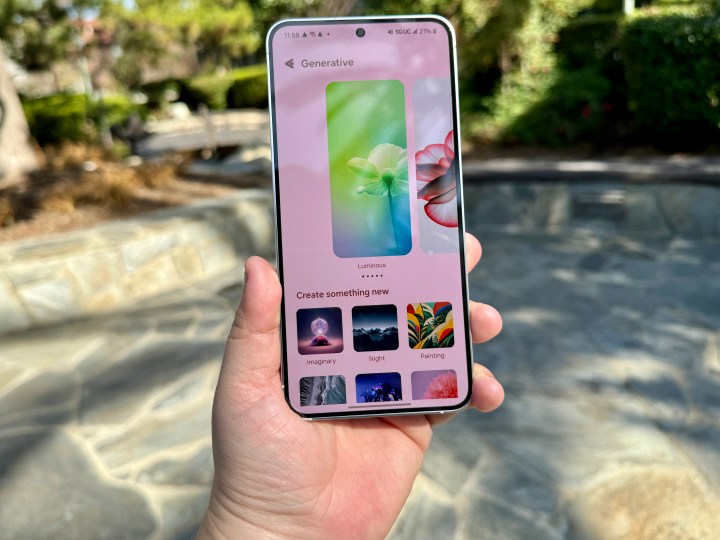
The Galaxy S24 series is notable for its new Galaxy AI features. Among these, the Circle to Search feature is likely the most popular. It allows you to search by simply circling images on the screen. Live Translate is also promising, offering real-time translations and transcription when you speak on the phone with someone in a different language.
With Notes Assist, your S24 can summarize text into clear, easy-to-review highlights. Additionally, the Generative Edit feature enables powerful photo editing tricks — allowing you to move subjects in your photos, remove unwanted objects, and more.
Although Galaxy AI features are coming to the Galaxy S23 series down the road, they aren’t heading to the Galaxy S21. If you want a phone with AI superpowers, your Galaxy S21 isn’t going to cut it.
Galaxy S24 vs. S21: price and availability
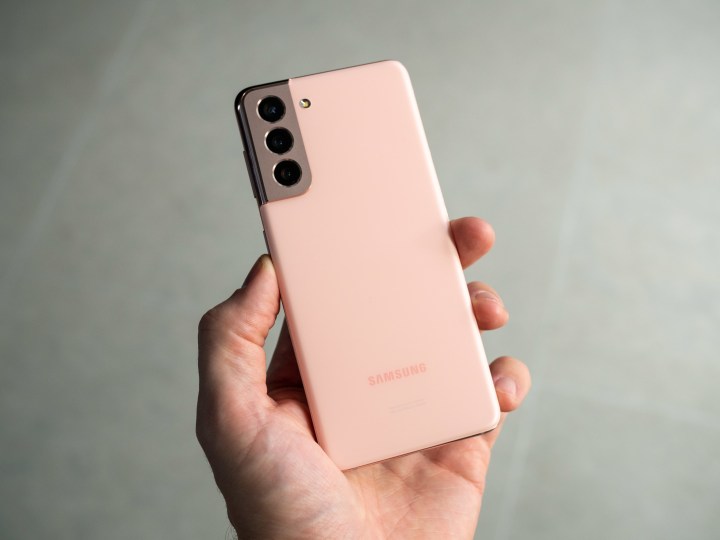
In the three years between the release of the Samsung Galaxy S21 and S24, Samsung did not raise the prices of its smartphones. Therefore, the S24 starts at $800, just like the S21.
The Galaxy S24 comes in four colors: Onyx Black, Marble Gray, Cobalt Violet, and Amber Yellow. Additionally, the Samsung website offers three exclusive colors: Jade Green, Sapphire Blue, and Sandstone Orange. It’s available with 128GB or 256GB of storage and is available now to purchase.
Galaxy S24 vs. S21: should you upgrade?
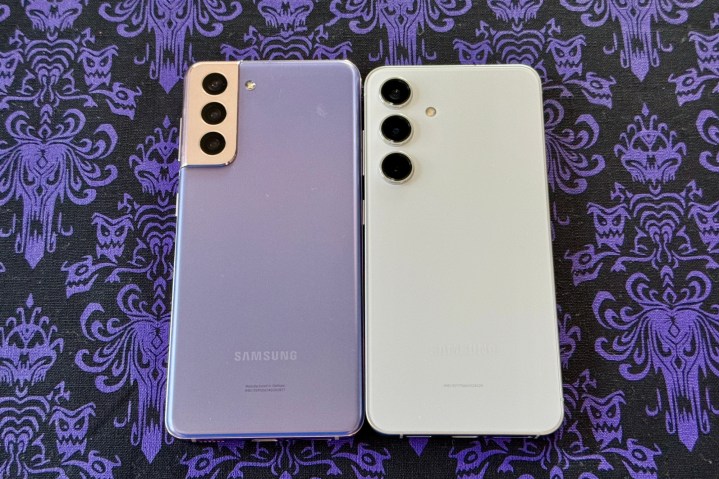
When your smartphone reaches the age of three, it’s usually a good idea to start thinking about upgrading to the latest model. If you’re considering upgrading from the Galaxy S21 to the all-new Galaxy S24, several upgrades on the newer model stand out. The Galaxy S24 has better internals and improved cameras, and it’s equipped with Galaxy AI. Moreover, Samsung has announced that the S24 will receive software updates for up to seven years. That guarantees you updates through January 2030. Meanwhile, the Galaxy S21 is promised one more year of updates before its four-year update guarantee runs its course.
If you’re still unsure whether to upgrade, there are two final things to consider. Firstly, your Galaxy S21 phone’s value will continue to depreciate, so you’ll pay more to upgrade later. Secondly, the Galaxy S24 is priced at $800, the same price you likely paid for your S21. With what inflation has done in recent years, you’d be spending less this time. Plus, with ample trade-in deals and other promotions available at Samsung.com, your carrier, and other retailers, you can almost certainly upgrade your Galaxy S21 to a Galaxy S24 without paying that full price.
In other words, yes — now is a good time to upgrade.
Editors’ Recommendations

